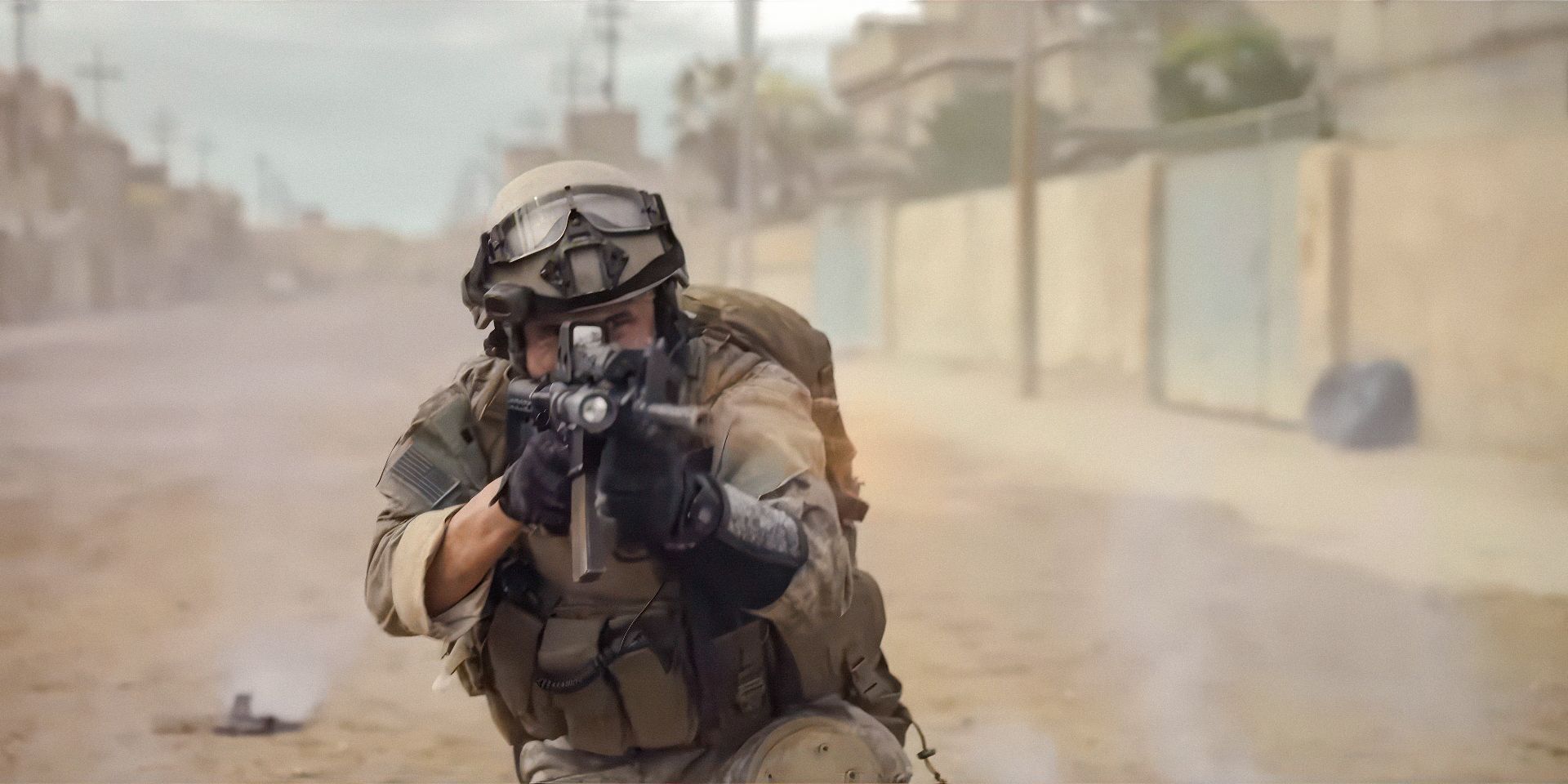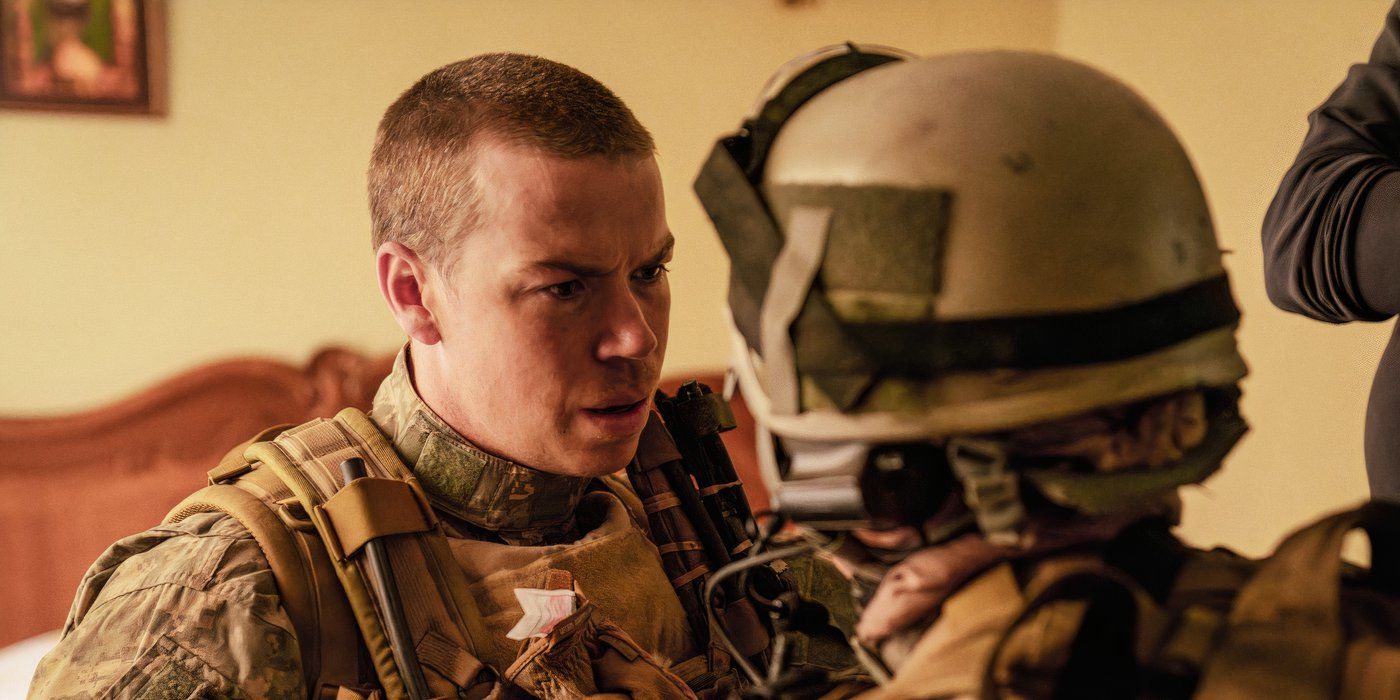The following contains spoilers for Warfare, now playing in theatersWarfare‘s more humanist approach to a common war movie trope avoids a common mistake with that genre. Co-directed by former NAVY SEAL Ray Mendoza and Alex Garland, Warfare was designed to be a very realistic movie. There’s no unrealistic heroism or sudden bursts of villainy. Instead, the movie is meant to be a painfully realistic approach to combat that reflects the true experiences that Mendoza and his platoon went through during the Second Gulf War, otherwise known as the Iraq War. As such, Warfare is a very different kind of war movie than the larger-scale films that proliferate the genre.
Among Warfare‘s characters are only a handful of Iraqi civilians and allied soldiers, who nevertheless ensure the film never fully others the citizens of the Anbar Province during the Battle of Ramadi. Instead, while the film isn’t focused on them at all, little touches surrounding those characters ensure they feel like people, albeit opposing ones who are confused, fearful, and angry about the American presence. This approach allows Warfare to avoid some problematic tropes of the war movie genre while also setting up one of the movie’s most emotionally charged and human moments.
Warfare Doesn’t Deal With The Politics Of The Second Gulf War
Warfare Is Focused On The Soldiers, Not The War
Warfare isn’t rooted in the political themes one would expect from a movie focused on the Second Gulf War, which ends up being a big reason the movie is so effective. While Warfare is deeply focused on soldiers and the experience of being caught in a combat situation, the movie isn’t really about war itself. The motivations behind the Second Gulf War aren’t expanded upon in the film, and none of the characters’ voices much about their political beliefs or personal motivations for joining the armed services. Instead, the movie remains laser-focused on the soldiers themselves and little beyond that.
This allows the film to focus on the specifics of warfare instead of debating the morality and necessity of war. These themes have been explored more thoroughly in other films, which come with a larger scope and perspective on the situation. Much like Alex Garland’s previous film Civil War, a great deal of Warfare‘s focus is on the people who are caught in these situations instead of delving into the situation itself. While this can be frustrating for audiences who want their films to have more thematic weight, it’s a different approach that accentuates the human perspective in these scenarios.
The Unnamed Iraqi Family In Warfare, Explained
A Group Of Civilians Are Caught Amid Warfare’s Conflict
One of the best ways Warfare does this is by having a handful of civilians be caught amid the chaos. Early in the film, Navy SEAL platoon Alpha One quietly takes a house in the middle of the night as an impromptu base of operations. To ensure their presence remains a secret, the soldiers don’t allow the Iraqi family who live in the building to leave, forcing them to remain amid the soldiers.
While the soldiers aren’t offensive or cruel to them, their presence is clearly unsettling to the family, especially their children. While the family is initially able to communicate with the soldiers through their translators Farid and Noor, both are killed in the IED blast. This leaves the family caught in the crosshairs as the locals open fire on the house and the Navy SEALs respond in kind. Their horror isn’t portrayed as anything less than realistic, with the parents desperate to keep their family safe.
This extends to the clearly felt horror and humanity of the unnamed Iraqi family, which leads to one of [Warfare‘s] most powerful emotional beats.
It’s a haunting moment that plays into the painfully grounded elements of the film. The Navy SEALs have to scramble to patch up their wounded compatriots. They aren’t action heroes who can bounce back from gunsH๏τs, they’re actual people who are in fear and scared during the battle. This extends to the clearly felt horror and humanity of the unnamed Iraqi family, which leads to one of the film’s most powerful emotional beats.
Warfare’s Most Vulnerable Moment Is Between Erik And The Iraqi Family
Erik And The Iraqi Mother Get A Charged Scene Together
While all of the Navy SEALs are left shaken during their experiences in the firefight, it’s Erik who has the clearest emotional beat thanks to the Iraqi family. The commander of Alpha One, he’s left dazed by the IED and finds himself unable to fully lead the team. During the height of the firefight and their subsequent evacuation, the mother of the civilian family screams at Erik the word “Why,” over and over again. Erik has nothing to offer her but apologies as they depart from the building and leave the wreckage in their wake.
It’s a powerful moment, one of the most emotionally charged scenes in the film. It’s a small but important moment, as it highlights the humanity of the family and makes sure that the audience doesn’t mistake them for faceless props. These are people who just had their lives turned upside down because of a conflict that came to their doorstep. Her cries deflate any argument that the war had no mistakes, as even the necessity of scouting could enrage the citizens.
Warfare Doesn’t Forget The Humanity Of The People Fighting The Navy SEALs
Warfare Doesn’t Treat The Iraqi People As Monsters
It’s easy in war movies to “other” the opposing forces facing off with the protagonists. The unnamed enemy soldiers can become faceless foes that the audience can vicariously celebrate being brought down. It can be a very dehumanizing approach to historical recreation, reducing one side of human people into fodder for action scenes. Warfare never does that. There’s no lionization of the soldiers, just a blunt portrayal of their resiliency and desperation in a tough situation. Likewise, while the locals don’t get any dialogue or character names, they aren’t portrayed as seedy monsters or corrupt legions.
They are soldiers just the same, as seen in Warfare‘s final moments when they all come out of hiding after the SEALs retreat. Many war films suffer from this problem, but Warfare‘s focus on the horror of combat ensures that the other soldiers still come across as people. They are shown planning, but also living average lives before the battle. The presence of the Iraqi civilians underscores this, their fear and anger over the situation turning to exhausted grief as they inspect the ruins of their home in the aftermath of the battle.
Warfare is dedicated to Elliott Miller, one of the NAVY SEALs who was seriously injured in the battle that is depicted in the film.
Warfare may not do much with the Iraqi characters, but there’s no condescension of them or use of them as nameless minions to be dispatched. They are an overwhelming force closing in on the protagonists, but not depicted as some thematic or moral threat. Warfare is focused on recreating a slice of life, albeit a difficult one due to the nature of combat. Warfare could have painted the local Iraqi as stereotypical villains or uncivilized hordes. Instead, their scouting scene early in the film shows them living their average lives.
Warfare portrays the locals just as the Navy SEALs — as people, who may not receive the same amount of focus but don’t suddenly lose that humanity. If anything, that makes both sides’ commitment to the firefight all the more harrowing. The politics of the filmmakers wasn’t the mission with Warfare, meaning no one has to be demonized. The danger posed by the insurgents is very real, and their actions against the SEALs are horrifying. Warfare is focused on the experience of war over moralizing about it, and it avoids some of the messy stereotypes that can appear in military-themed films.







